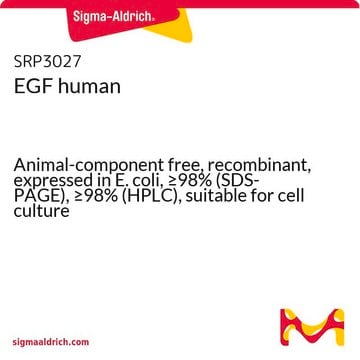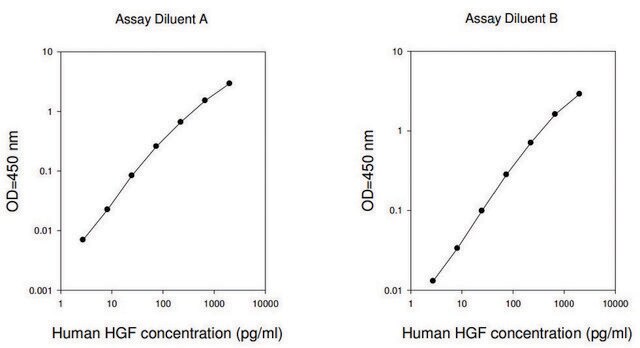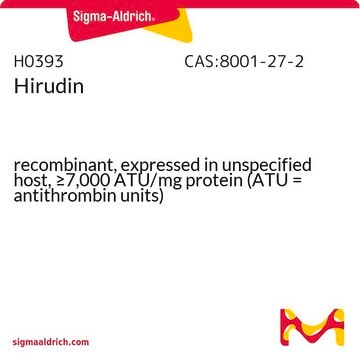SRP3300
HGF mouse
recombinant, expressed in Hi-5 Insect cells, ≥95% (SDS-PAGE), ≥95% (HPLC)
Synonym(s):
Hepatopoietin (HPTA), Scatter Factor (SF)
Sign Into View Organizational & Contract Pricing
All Photos(1)
About This Item
UNSPSC Code:
12352202
NACRES:
NA.32
Recommended Products
biological source
mouse
recombinant
expressed in Hi-5 Insect cells
Assay
≥95% (HPLC)
≥95% (SDS-PAGE)
form
lyophilized
potency
10-20 ng/mL
mol wt
80.0 kDa
packaging
pkg of 20 μg
impurities
<0.1 EU/μg endotoxin, tested
color
white to off-white
UniProt accession no.
shipped in
wet ice
storage temp.
−20°C
Gene Information
mouse ... HGF(15234)
General description
Hepatocyte growth factor (HGF) is a plasmin related disulfide-linked, hetereodimeric protein containing an α and a β chain. It is synthesized as inactive, single-chain precursor which shares similarity with plasminogen. Its α chain contains an N-terminal hairpin and four kringle domains (NK4).
Biochem/physiol Actions
Hepatocyte growth factor (HGF) functions via its receptor c-Met, which gets activated upon tyrosine phosphorylation, and subsequently promotes epithelial cell proliferation, morphogenesis, angiogenesis and motility. It plays a crucial role in organ development, as inactivation of either this gene or its receptor in fetal stages results in organ hypoplasia. Endogenously this protein is involved in the self-repair of various ograns including injured livers, kidneys, lungs etc. HGF is a predominant potent factor involved in lung growth and repair. It functions as a motogen, tubulogen and anti-apoptotic agent on airway epithelial and other cells expressing HGF receptor c-Met. Studies in mice show that HGF determines the severity of Pseudomonas aeruginosa keratitis by enhanced HGF signaling through c-met resulting in elevated pro-inflammatory cytokines and reduced anti-inflammatory cytokines.
Physical form
Lyophilized from 10 mM Tris, pH 7.2 + 100mM L-Arginine + 200 mM NaCl.
Reconstitution
Centrifuge the vial prior to opening. Reconstitute in water to a concentration of 0.1-1.0 mg/mL. Note: Slow to dissolve. Do not vortex. This solution can be stored at 2-8°C for up to 1 week. For extended storage, it is recommended to further dilute in a buffer containing a carrier protein (example 0.1% BSA) and store in working aliquots at -20°C to -80°C.
Storage Class Code
10 - Combustible liquids
WGK
WGK 3
Flash Point(F)
Not applicable
Flash Point(C)
Not applicable
Certificates of Analysis (COA)
Search for Certificates of Analysis (COA) by entering the products Lot/Batch Number. Lot and Batch Numbers can be found on a product’s label following the words ‘Lot’ or ‘Batch’.
Already Own This Product?
Find documentation for the products that you have recently purchased in the Document Library.
Customers Also Viewed
Regulation of hepatocyte growth factor in mice with pneumonia by peptidases and trans-alveolar flux.
Raymond WW et al
PLoS ONE, 10(5), e0125797-e0125797 (2015)
HGF signaling impacts severity of Pseudomonas aeruginosa keratitis.
Jiang X et al
Investigative Ophthalmology & Visual Science, 55(4), 2180-2190 (2014)
Kaisa L Hanley et al.
Molecular cancer research : MCR, 20(3), 337-349 (2021-11-24)
The Ras/Erk and NF-κB pathways play critical roles in cell proliferation and are known to drive oncogenesis when overactivated. Herein we report a gatekeeper function of the two pathways by working in synergy to suppress liver tumorigenesis. Hepatocyte-specific deletion of
L Naldini et al.
The EMBO journal, 10(10), 2867-2878 (1991-10-01)
Scatter Factor (SF) is a fibroblast-secreted protein which promotes motility and matrix invasion of epithelial cells. Hepatocyte Growth Factor (HGF) is a powerful mitogen for hepatocytes and other epithelial tissues. SF and HGF, purified according to their respective biological activities
Rosaria Gangemi et al.
Pigment cell & melanoma research, 27(6), 1138-1148 (2014-08-16)
Uveal melanoma (UM) is a rare ocular tumor that may lead to deadly metastases in 50% of patients. A disintegrin and metalloproteinase (ADAM)10, ADAM17, and the HGF-receptor c-Met support invasiveness in different tumors. Here, we report that high ADAM10, MET
Our team of scientists has experience in all areas of research including Life Science, Material Science, Chemical Synthesis, Chromatography, Analytical and many others.
Contact Technical Service









